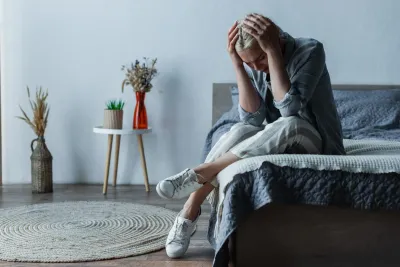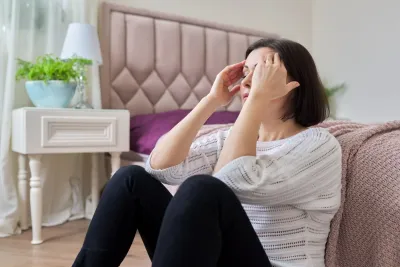Menopause Sleep Problems: Natural Remedies for Better Sleep
Ana Marie Schick: Resident Sleep Expert and Certified Health Coach • Oct 03, 2024

Key Takeaways
Menopause-related sleep problems are driven by hormonal shifts that disrupt temperature regulation, stress response, and sleep continuity—but natural strategies can help restore more restful nights.
- Hot flashes, night sweats, and fluctuating hormones commonly interrupt sleep during menopause, leading to frequent wake-ups and poor sleep quality.
- Natural remedies such as mindfulness practices, consistent bedtime routines, and targeted supplements like magnesium or black cohosh may help ease symptoms.
- Maintaining a cool sleep environment—ideally between 60–67°F—can significantly reduce nighttime overheating and support deeper sleep stages.
- Temperature-regulating sleep tech, including water-based cooling mattress pads, can help stabilize body temperature throughout the night.
- A whole-body approach that includes balanced nutrition, hydration, stress management, and daily movement is key to improving sleep during menopause.
Many women experience poor sleep during menopause due to symptoms such as insomnia, hot flashes, and night sweats. Fortunately, there are natural remedies to help with menopause-related sleep issues.
Below, we’ll discuss effective and natural methods to help improve your sleep quality during menopause, including using herbal supplements, making lifestyle adjustments, and practicing mind-body techniques.
What Causes Sleep Problems During Menopause?
During menopause, changes in hormone levels can cause various sleep problems. Fluctuating estrogen levels can narrow the temperature range that women find comfortable for sleep, making it difficult to fall and stay asleep, leading to poor sleep quality.
These hormonal changes affect how your body controls heat, leading to restlessness and discomfort at night.
A decline in estrogen is directly associated with triggering hot flashes and night sweats—two prominent symptoms during menopause that significantly impact your ability to get a good night’s sleep.
Related Blog: Menopause and Sleeping Too Much: Solutions for Managing Fatigue
Cool Down Menopause Symptom Naturally
Our bed cooling systems can help you experience cooler sleep during menopause, promoting a more natural and effective approach to managing your symptoms.
Common Menopause-Related Sleep Disorders
Many women experience sleep difficulties during menopause, often as a result of their menopause-related symptoms. Waking up suddenly because of discomfort and restlessness can significantly impact their health.
Menopause Insomnia
Menopause insomnia is a sleep disorder that often affects women during the menopausal transition. Sleep patterns can be significantly disrupted as hormone levels fluctuate, particularly estrogen and progesterone.
Hormone levels can lead to difficulty falling asleep, staying asleep, or both. This can last weeks or months, leading to chronic fatigue and increased irritability, which negatively impacts daily functioning and efficiency.
Women experiencing menopausal insomnia may encounter frequent awakenings at night, early morning arousals, or a feeling of not having restful sleep.
Menopause Sleep Apnea
Menopause can make sleep apnea more common. Menopause sleep apnea is a sleep disorder characterized by frequent interruptions in breathing during sleep. These interruptions, known as apneas, occur when the airways collapse, preventing oxygen from reaching the brain.
Throughout menopause, hormonal fluctuations can play a significant role in the onset or exacerbation of sleep apnea. Signs of sleep apnea during menopause might include snoring, sudden gasping for air, excessive daytime sleepiness, and morning headaches.
Related Blog: How to Support Your Partner Through Menopause
Menopause Natural Remedies
Women experiencing menopausal symptoms may find a safe and effective solution to their sleep issues through natural remedies. While the effectiveness of these remedies may vary, a lot of women find relief by taking herbal supplements, making lifestyle changes, and practicing mind-body exercises.
These strategies could potentially lessen the severity of menopause symptoms and improve sleep quality.
More: You’re not alone—navigating it can be tough, but these menopause self-care tips can help you stay balanced and healthy.
The following sections will introduce alternative methods that go beyond traditional pharmaceutical approaches and examine specific natural remedies, such as herbal treatments, lifestyle adjustments, and physical activities, aimed at promoting improved sleep and overall well-being during menopause.
Herbal Remedies for Menopause Sleep Problems
Many women use herbal remedies to help relieve symptoms linked to menopause, such as sleep disturbances and menopausal discomforts.
Black Cohosh
Black cohosh is a popular herbal remedy often used to alleviate menopausal symptoms. While research on its effectiveness is ongoing, it has shown promise in addressing some of the common challenges of menopause. [1] This may involve alleviating hot flashes, depression, and other symptoms experienced during menopause. [2]
A recent study found that black cohosh might help promote better sleep by reducing hot flashes and other symptoms that disrupt sleep patterns. [3]
Despite its advantages, it could potentially cause digestive discomfort and skin irritations.
Note: Individual experiences may vary. If you're considering trying black cohosh, discuss it with your healthcare provider to determine if it's suitable for you.
Valerian Root
Valerian root is a natural herb that promotes relaxation and improves sleep. While it's primarily known for its calming effects, some have found it helpful in managing menopausal symptoms.
It's thought that the herb's ability to reduce anxiety and stress can indirectly relieve common symptoms, including women who experience hot flashes and night sweats, which are often linked to emotional factors.
Study: An 8-week study showed that taking 255 mg doses of valerian root three times a day reduced the frequency of hot flashes in menopausal women. [4]
Additionally, the sleep-promoting effects of valerian root can assist women in managing the sleep disruptions frequently experienced during menopause.
Similar to other herbal remedies, conduct research as individual responses to valerian root can vary, and always reach out to your healthcare provider before starting any new supplement.
Chamomile Tea
Chamomile, a beloved herbal tea, is not just a calming drink. It also offers potential benefits for women experiencing menopausal symptoms. With its compounds that can help reduce anxiety and stress, chamomile could be a valuable ally in managing hot flashes and night sweats. Its sedative effects can also enhance sleep quality, a common issue during menopause.
Related Blog: The 10 Best Drinks That Can Help You Sleep Better

Lifestyle Changes for Better Sleep
One effective way to improve sleep quality during the menopausal transition is to establish a regular nighttime ritual. This could involve engaging in relaxing activities before bed and minimizing exposure to electronic screens. Such a ritual can make it easier to fall asleep and stay asleep, contributing to better overall health.
Practicing mindfulness and relaxation techniques can really help reduce stress. Lowering stress levels may lead to fewer hot flashes and night sweats, making it easier to enjoy a good night’s sleep without interruptions.
Making these changes and other natural remedies offers a well-rounded approach to improving sleep during menopause. It helps tackle common menopause issues such as trouble falling asleep, hot flashes, and night sweats, leading to more restful nights.
Exercise and Physical Activity
Staying active during menopause can make a big difference in how well you sleep. Exercise contributes to improved muscular function, better cardiovascular health, and heightened overall well-being – all of which are vital during this transitional phase for women.
Regular morning exercise not only helps women to fall asleep more easily but also enables them to attain deeper and more restorative sleep.
Did You Know: Many women who have trouble sleeping experience psychological symptoms, including anxiety during perimenopause and menopause. If these symptoms are contributing to your sleep problems, regular exercise can effectively help manage them.
Activities that raise the heart rate, such as walking or jogging and flexibility exercises including yoga, can positively impact one's ability to achieve a good night's sleep.
Committing to at least 30 minutes of moderate-intensity exercise every day can significantly improve your ability to fall asleep easily and stay asleep throughout the night. [5]
Sleep Environment Optimization for Menopause Relief
If you’re struggling with hot flashes and night sweats during menopause, creating a cool and comfortable sleep environment can be a game-changer. Consider using the Chilipad Dock Pro, the best cooling mattress pad, or Cube, the original mattress pad to regulate the temperature of your mattress. This can help reduce the frequency and intensity of hot flashes, allowing for a more restful night’s sleep.
Breathable fabrics including cotton or linen, cooling pillows, and cool bedding can also contribute to a more comfortable sleep experience.
- Chilipad Dock Pro: Our best cooling mattress topper and smartest system yet! Faster, quieter, and fully app-controlled with Wi-Fi. Its tubeless pad and advanced water cooling tech bring high-performance comfort straight to your bed.
- Cube: A simpler, remote-controlled solution that still delivers the same 55°F to 115°F temperature range. This original cooling mattress topper uses a traditional water-tube design and is a great entry-level choice for anyone looking to improve their sleep environment without all the extra tech.
Finally sleeping my best sleep during menopause! - Tara (Trustpilot Review)
Reduce Menopause Symptoms—Backed by Real Results
Hot flashes, night sweats, and restless nights don’t stand a chance. In a recent study, women using our cooling bed systems experienced a 30% improvement in sleep scores and a 50% reduction in hot flash severity. With the Chilipad Dock Pro or Cube, you can take back control, customize your sleep temperature down to 55ºF, and experience relief, night after night.
Mind-Body Practices
Mindfulness, yoga, and meditation can be incredibly helpful in managing menopause symptoms and improving sleep quality. These practices reduce stress and anxiety, which are common during menopause and can enhance the effectiveness of other treatments. [7]
Adding yoga and meditation to your daily routine has been shown to greatly improve emotional well-being and sleep for women going through menopause. [8]
Give them a try and see which works best for you—these practices promote relaxation and can make it easier to achieve restful, high-quality sleep while helping relieve menopause symptoms naturally. Give it a try and see how it works for you!
Tip: If you're looking for empowering, insightful podcasts? Check out our list of the best women’s health and wellness podcasts. These podcasts cover everything from navigating menopause to mental health, hormones, fitness, and beyond.
Stay Hydrated
Staying well-hydrated is important for good health, particularly during menopause.
By staying hydrated, you can reduce the intensity of symptoms and improve your sleep quality. Proper hydration helps ease discomfort, making it easier to enjoy a good night’s sleep
Relaxation Techniques
Relaxation techniques, simple yet effective, can really help women going through menopause sleep better. Deep breathing, a straightforward practice, can calm you down and make it easier to fall asleep. It creates a peaceful atmosphere, which plays an important role in reducing symptoms naturally.
Progressive Muscle Relaxation (PMR), a technique involving the deliberate tension and release of different muscle groups, is a powerful stress and anxiety reducer.
When paired with deep breathing, these two techniques form a potent duo that can significantly enhance sleep quality and promote easier sleep onset for women in menopause.
Choosing the Right Remedy for Menopause Sleep Problems
Finding the right solution for sleep problems during menopause is all about what works best for you. Hormone replacement therapy (HRT) is a conventional treatment option that many women consider for managing menopausal symptoms.
Track your sleep patterns and habits to help determine what’s causing the issues.
It’s always a good idea to talk to your doctor. They can suggest safe and effective options like hormone therapy or natural remedies. Working with your doctor can help you find a plan that addresses your sleep problems and keeps you healthy overall.
Cognitive Behavioral Strategies
Cognitive Behavioral Therapy for Menopausal Insomnia (CBT-mi) is a great way to improve sleep during menopause. [9] It helps change negative thoughts and behaviors that can make sleeping difficult.
CBT-mi involves 4-6 sessions where you learn about sleep, change your thinking patterns, and practice new behaviors to help you sleep better. You’ll also learn relaxation techniques such as deep breathing and progressive muscle relaxation to reduce anxiety.
Keeping a sleep diary and limiting your time in bed can also help. These strategies can increase your “sleep pressure” and help you develop long-lasting skills for managing insomnia.
Alternative Therapies
Alternative therapies, including acupuncture, aromatherapy, and hypnosis, can be helpful. Acupuncture can reduce symptoms of menopause, including sleep problems.
Lavender, used in aromatherapy, has been shown to improve sleep quality and reduce insomnia. Hypnosis can also help improve sleep and reduce hot flashes.
Before trying alternative therapies, take time to discuss them with your doctor. They can help you determine if these therapies are right for you and how to use them safely.
Once you’ve discussed your options, these alternative therapies can be a helpful addition to your treatment plan for sleep problems during menopause
Conclusion
Managing menopause and sleep problems can be challenging, but there are numerous natural remedies for menopause to consider. Herbal supplements, lifestyle adjustments, relaxation methods, and cognitive-behavioral therapy can all help alleviate menopause symptoms and enhance the quality of your sleep.
Natural treatments may require time to take effect. Speaking with your doctor can help you determine the most suitable approach for your needs.
Frequently Asked Questions About Sleep Remedies for Menopause
Which Natural Remedies Work Best for Menopause-Related Sleep Problems?
While everyone is different, there are some natural remedies that can help reduce the symptoms of menopause.
- Herbal Supplements: Valerian root, chamomile, and passionflower are often recommended for their calming effects.
- Dietary Changes: Eating a balanced diet, limiting caffeine and alcohol, and avoiding heavy meals close to bedtime can improve sleep.
- Lifestyle Adjustments: Establishing a sleep schedule, creating a relaxing bedtime routine, and managing stress can also help.
It's important to consult with a healthcare professional before starting any new supplements or making significant lifestyle changes
How Soon Can I Expect to See Improvements in My Sleep?
The time it takes to see improvements in sleep with natural remedies can vary from person to person. Factors like the severity of your symptoms, the specific remedies you're using, and your overall health can influence the results.
Some women notice improvements within a few weeks of starting natural remedies, while others may take longer.
Are Cooling Mattress Toppers and Bed Cooling Systems Worth the Investment?
Yes, investing in a bed cooling system for those who struggle with night sweats or heat-related sleep disturbances can provide relief. These systems and mattress toppers can significantly improve sleep quality and comfort, especially during menopause.
We partnered with Wake Forest University to conduct a menopause study analyzing the role of our cooling bed system products (Chilipad Cube and Chilipad Dock Pro) and sleeping cool to help relieve the symptoms of menopause (hot flashes & night sweats). Participants improved their sleep score by 30%.
Are there specific mattresses recommended for menopause comfort?
There is no menopause specific mattress, but cooler sleeping materials help. Surface temperature matters more. Chilipad fits on nearly any mattress type, including memory foam, hybrid, latex, innerspring, and split or adjustable beds, so you can keep your mattress and control heat right where menopause symptoms hit hardest.
Peer-Reviewed Research References
-
Office of Dietary Supplements (NIH).
Black Cohosh: Health Professional Fact Sheet.
National Institutes of Health, n.d.
Study Type: Government Supplement Evidence Review
Key Finding: Black cohosh has been studied for menopausal symptom relief, particularly hot flashes and sleep disturbances, though evidence varies and safety considerations should be reviewed with a healthcare provider.
View Resource
Source URL: https://ods.od.nih.gov/factsheets/BlackCohosh-HealthProfessional/
-
Geller, S. E., & Studee, L.
Botanical and Dietary Supplements for Mood and Anxiety in Menopausal Women.
Menopause, 2007.
Study Type: Clinical Review
Key Finding: Certain botanical supplements, including black cohosh and valerian, may offer modest benefits for mood, anxiety, and sleep-related symptoms in menopausal women, though results are mixed.
View Study
Source URL: https://pubmed.ncbi.nlm.nih.gov/17194961/
-
Jiang, K., et al.
Black Cohosh Improves Objective Sleep in Postmenopausal Women with Sleep Disturbance.
Climacteric, 2015.
Study Type: Controlled Clinical Trial
Key Finding: Black cohosh supplementation was associated with measurable improvements in objective sleep parameters among postmenopausal women experiencing sleep disturbances.
View Study
Source URL: https://pubmed.ncbi.nlm.nih.gov/26000551/
-
WebMD.
Health Benefits of Valerian Root.
WebMD, November 23, 2022.
Study Type: Medical Education Resource
Key Finding: Valerian root is commonly used as a natural sleep aid and may help improve sleep onset and quality, though individual responses vary.
View Resource
Source URL: https://www.webmd.com/diet/health-benefits-valerian-root
-
D?browska-Galas, M., et al.
High Physical Activity Level May Reduce Menopausal Symptoms.
Medicina, 2019.
Study Type: Observational Clinical Study
Key Finding: Higher levels of physical activity were associated with reduced severity of menopausal symptoms, including sleep complaints and fatigue.
View Study
Source URL: https://pubmed.ncbi.nlm.nih.gov/31405242/
-
Avis, N. E., et al.
Cooling Mattress Pad to Reduce Vasomotor Symptoms and Improve Sleep.
Menopause, 2022.
Study Type: Pilot Clinical Trial
Key Finding: Use of a cooling mattress pad significantly reduced hot flashes and improved sleep quality in postmenopausal women experiencing vasomotor symptoms.
View Study
Source URL: https://doi.org/10.1097/GME.0000000000002010
-
Sung, M. K., et al.
Meditation and Menopausal Symptoms: A Pilot Cross-Sectional Study.
Medicine (Baltimore), 2020.
Study Type: Pilot Observational Study
Key Finding: Meditation practice was associated with reduced menopausal symptoms and favorable changes in stress-related biomarkers, suggesting potential benefits for sleep and well-being.
View Study
Source URL: https://pubmed.ncbi.nlm.nih.gov/32899065/
-
Xu, H., et al.
Effects of Mind–Body Exercise on Perimenopausal and Postmenopausal Women.
Menopause, 2024.
Study Type: Systematic Review & Meta-Analysis
Key Finding: Mind–body exercises such as yoga and tai chi significantly improved sleep quality, mood, and overall menopausal symptom burden.
View Study
Source URL: https://doi.org/10.1097/GME.0000000000002336
-
Drake, C. L., et al.
Treating Chronic Insomnia in Postmenopausal Women.
Sleep, 2019.
Study Type: Randomized Clinical Trial
Key Finding: Cognitive behavioral therapy for insomnia (CBT-I) was more effective than sleep hygiene education alone for improving sleep in postmenopausal women with chronic insomnia.
View Study
Source URL: https://pubmed.ncbi.nlm.nih.gov/30481333/









